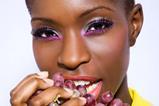Woman Alive's editor-in-chief Tola-Doll Fisher shares her thoughts on the highly anticipated Barbie movie.

*SPOILER ALERT – do not read if you haven’t yet watched the film!*
I suspect my generation (millennials) were the last to grow up with Barbie dolls seen for what they are – dolls. Younger generations have (rightly) pointed out the problematic attributes of what Greta’s film calls, "Stereotypical Barbie", played excellently by Margot Robbie. Namely, the Aryan aesthetic, the impossible body standard and the obsession with pink (actually, the pink remains a staple because as Lizzo’s aptly titled song "Pink" goes: “We like other colours / But pink just looks so good on us!”).
So, it seems surprising that in a world where we – publicly at least – champion a move away from stereotypical, that a film based on a skinny white doll with big boobs, blonde hair and blue eyes should be so greatly anticipated. But maybe we all just need a bit of light relief and that’s not something guaranteed from a film about someone who created a deadly atomic bomb that threatened to wipe out the earth (Oppenheimer).
This self-reflecting Barbie is on a road to discovery that appears to stop just short of finding Jesus.
On the diversity issue, I’m coming at this from the position of being a dark-skinned black woman with natural tight curls that do not hang around my shoulders ready to be French braided or teased into bouncy waves down my back. In theory, I should be one of those in uproar about the very existence of a doll that reminds me of who – and what – I am not. Plot twist: I am not in uproar. (Although I have my concerns when people think that Jesus looked like Ken with long hair and a beard).
I grew up playing with dolls of all types, including paper dolls introduced to me by my artist and later fashion designer cousin who showed me how to draw my own dolls and then make clothes for them. I was always a fan of the colour pink and had a Barbie cake for my 18th birthday. Granted the cake was essentially a huge pink dress centred around a black Barbie, but either way, I spent more time projecting my ideas onto my dolls – what they wore, who they dated, where they went on holiday – than the other way around. It’s problematic when we expect plastic things to be in any way representative of real life aesthetics but maybe that’s just us humans trying to play God?
Read more on films
As Scream VI hits cinemas - here’s what I think about Christians watching horror films
Are you there, God? It’s me, and I’m like Margaret
Mrs. Harris Goes to Paris is a sweet film with some very Christian values
I don’t know how much Barbie needed a PR boost but this film does try to make Barbie seem more than just, as she was called by the character Sacha, "a white saviour". Margot Robbie’s Barbie is joined by a cast of other Barbies, including “President Barbie”, played by African-American actor and director Issa rae. Throughout the film you get the sense Greta wants to almost dethrone “Stereotypical Barbie” – but in the nicest way possible because there is clearly still a fan base who wants to see her alive and well.
As the main protagonist, Margot Robbie’s “Stereotypical Barbie” gets majority screen time but in the end, having gently absolved Ken of his assumed obligations to kickstart the patriarchy in Barbieland (which provides some of the funniest scenes in this film), she claims to just want to live a normal life in the “real world”. We see the most famous doll in the world crying, having to walk with her feet flat on the ground (if this means nothing to you, go find a Barbie doll and check out her feet) and worrying about death. We see her encouraging Ken to go find a life outside of her when he claims mournfully, ‘”I only exist within the warmth of your gaze” and we see her shock at discovering that she is not as loved in the real world as she thought. This self-reflecting Barbie is on a road to discovery that appears to stop just short of finding Jesus.
As Christians, we can take comfort in reminding ourselves that we are created in the image of God, not Barbie.
Although Jesus was not *spoiler alert*, present in this film, He would surely approve of the monologue by America Ferrera‘s character, Gloria, an employee at Mattel which feels affirming and life-giving. The now widely circulating “Being a woman is hard” speech includes these stand out statements: “Not only are you doing everything wrong but everything is your fault”, “I’m tired of seeing women tie themselves up in knots so that people will like you”, “The ways that women have to be strong, but not too strong so as to not intimidate men”, “The ways we have to love our children but not make them our whole identity, and certainly never complain.” Hear, hear! For Woman Alive readers, surely these words will resonate to the core.
All that said, it’s a weighty responsibility for a doll to represent all women and it’s not a call Barbie fans have asked for, but this film does a good job of Mattel being aware of its own shortcomings and hopefully reminds us all that the most famous doll in the world is, after all, just a doll. And, as Christians, we can take comfort in reminding ourselves that we are created in the image of God, not Barbie.
P.S. Yes, I dressed up.




































1 Reader's comment